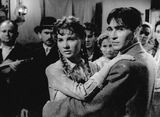
Treasures from the European Film Archives 2004 / Körhinta / Hungary 1955
The restored copy of what is today a classic love story from a Hungarian village of the mid-1950s with Mari Törőcsik in the main role. One of the first great international successes of post-war Hungarian cinematography.


A romantic drama from a Hungarian village of the mid-1950s. The story of the love and rebellion of Mari Pataki, a timid young girl, has been betrothed to a wealthy bridegroom, a match her parents made for reasons of expediency. But she is in love with Mátéus, a young member of a cooperative. Their story is framed by the turbulent changes in society at that time and the persistence of old traditions. In his own words, Fábri always tries to make films which protest against degradation and violence, against belittling the right to human dignity, and Merry-Go-Round is the first in which this theme appears unambiguously. A special magic is given to individual scenes and the film as a whole by variations in rhythm, the poetic camera of Barnabás Hegyi and the functional musical accompaniment of György Ránky. Today, the ride of the two lovers on the merry-go-round ranks among the classic sequences in international cinematography. The dazzling debut performance of Mari Törőcsik, at that time a second year student at the School of Dramatic Arts, set her off on her career to stardom. Fábri’s Merry-Go-Round recorded one of the first great international successes of post-war Hungarian cinematography.
101 min / Black & white, 35 mm
Director Zoltán Fábry
/ Screenplay Zoltán Fábri, László Nádasy podle románu/ based on the novel by Imre Sarkadi
/ Dir. of Photography Barnabás Hegyi
/ Music György Ránki
/ Editor Ferenc Szécsényi
/ Production Magyar Filmgyártó Állami Vállalat Hungarian Film Studios
/ Cast Mary Törõcsik, Imre Soós, Ádám Szirtes, Béla Barsi, Manyi Kiss
/ Contact Národní filmový archiv

Zoltán Fábri (1917, Budapest–1994, Budapest) studied design at the Academy of Fine Arts and acting at the Academy of Dramatic Art. He began his career as a theatre designer, actor, and later director. His first film as a director was the village drama The Storm (Vihar). Selected filmography (except for TV): the drama of a man who gave in to the pressure of his conformist surroundings Hannibal tanár úr (1956); the psychological drama Darkness in Daytime (Nappali sötétség, 1963); the political drama Twenty Hours (Húsz óra, 1965, Grand prix ex aequo at the 4th IFF in Moscow); in Americo-Hungarian co-production, a transcription of Ferenc Molnár’s novel The Boys of Paul Street (Pál-utcai fiúk, 1969); a drama about the fates of women behind the gates of a cloister Ant Hill (Hangyaboly, 1971); adaptations of two novels by József Balázs: Hungarians (Magyarok, 1977); and Balint Fabian Meets God (Fábián Bálint találkozása Istennel, 1980, Prize for Best Male Performance at the 8th IFF in New Delhi).
Národní filmový archiv
Závišova 5, 140 00, Praha 4
Czech Republic
E-mail: [email protected]

Blažena Urgošíková
Film Institution Rep.

Vladimír Opěla
Film Institution Rep.
First-hand brews throughout the year.
Be among the first to learn about upcoming events and other news. We only send the newsletter when we have something to say.